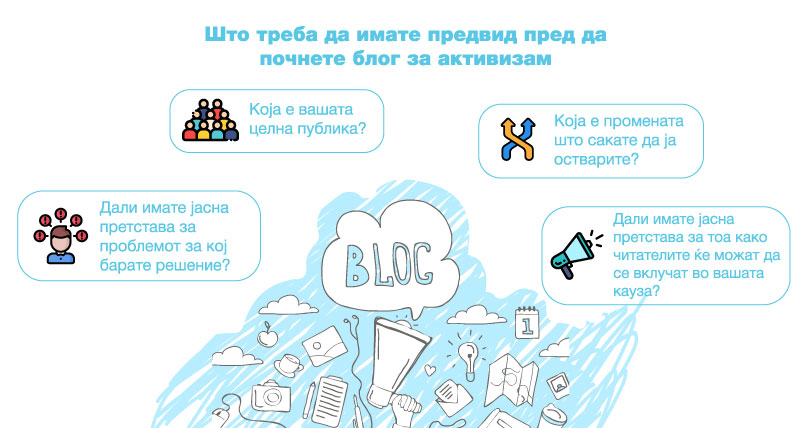Besides from being a great tool for promoting, raising public awareness of a particular brand and discussing with consumers and interested readers, blogging can also be an effective tool for activism. Essentially, blogging can influence the direction of achieving social change.
Blogging can be used to “fight” various social injustices. When it comes to unfair practices or government corruption, a blog can be a means of exposing irregularities in the work of government institutions.

The essence of blogging for social change is building a community of citizens who express their views on social injustice.
When it comes to air pollution in Macedonia, a blog can be used as a means of educating citizens on how to protect themselves from the devastating effects that pollution has on health. Additionally, a blog can encourage citizens to get involved in activism and the fight against air pollution, or it can be used to call for participation in a protest.
The blog allows anyone with an internet connection to launch a campaign for social change with the potential to be heard, both locally and globally.

Blog posts also present a chronicle of what happened in a certain period when there was increased civic activism. Despite the fact that what we read on the Internet can be removed very easily, the content can still be published in multiple places and by different authors, which increases the chances of it remaining as a longer-lasting resource.
Multimedia
The blog can also contain photos, videos, graphics, and other types of multimedia content. This allows space for easier sharing on social media, but it is also a great way to convey the cause to the public through different types of media (traditional and online).
Comments
Comments are also a way for the community to get involved in discussing an issue. That way, they will feel like they are part of the solution to a particular problem, which facilitates joining forces for a particular cause.
Basically, a blog is a great advocacy tool, because it allows anyone with an internet connection to launch a campaign for social change. It empowers ordinary citizens to oppose authorities, to act as alternative sources of information, to organize supporters, and to lobby those in power.

A local example of a form of activism through blogging is Media Pedia (www.mediapedia.mk). Their team published data on ownership of media outlets in Macedonia, revealing political influences on public opinion through media.
Content is key
No matter what identity you give your blog, you need to keep in mind that content is key. The content will engage the reader and encourage discussion. Quality content is what will keep readers coming back to your blog.
This is why you must think about what you want to achieve with your blog. What issue will be your focus? What is the primary target audience that you want to reach? Attracting a loyal readership is what will make your blog a place where readers are regularly informed on matter of public interest and through which they can engage in the “action”.

Blogging was one of the main ways in which citizens tried to raise public awareness regarding the events during the 2011 Arab Spring.

